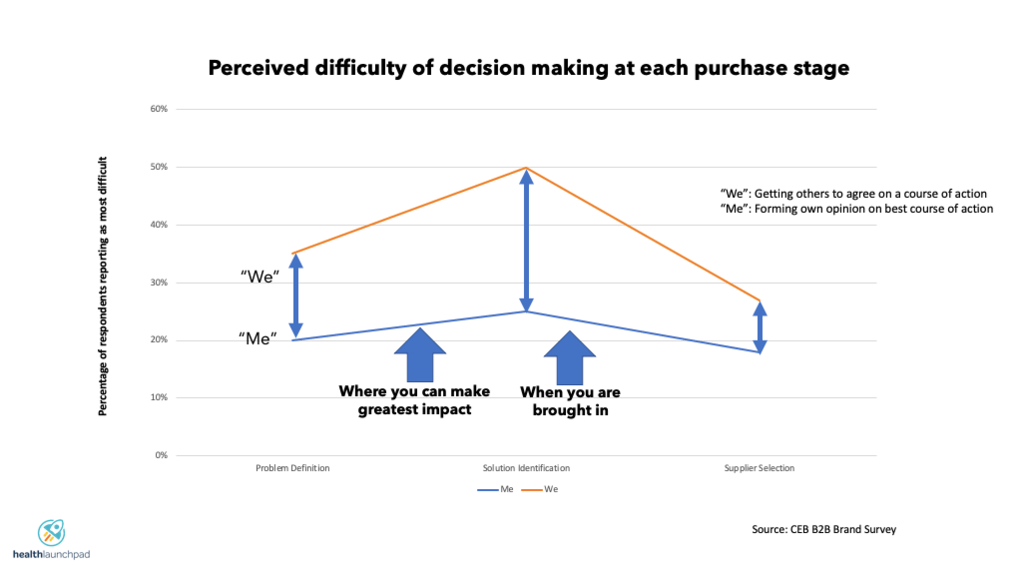
The Seven Personas of Sales Champions
In complex sales, 3 will help you, but 4 out of 7 personas of sales champions will break you.
And so, in complex sales, we are dependent on identifying a sales champion, someone who will help us navigate the decision-making process.
In this post, I will review insights about sales champions. The ideal sales champion does not exist, and I will explain why below. In reality, there are seven personas of sales champions. Some can help propel you through the process, while others will hurt your chances.
I recently ran a webinar on this topic. You can view the recording and download the presentation here.
The Challenger Customer

This Challenger Customer is one of the best business books I have read. A group wrote it of executives from the Corporate Executive Board (CEB), which is now part of Gartner. It was a follow-up to the Challenger Sale, which is the book most people are familiar with.
I prefer the Challenger Customer. What I like most is that they talked to over 3,000 stakeholders involved in B2B purchase processes, so the ideas and insights are based on facts, not just inspiration.
Slowing Sales Cycles
One of the topics the book raises is why deals are moving slower. There are many reasons:
- Consolidation is creating bigger organizations that are harder to deal with. This is especially true in healthcare.
- Management teams are flatter and more consensus-driven.
- Because information is more freely available, stakeholders form their own opinion and often make decisions before they meet you.
- Compliance and risk management are increasingly slowing the process down, especially HIPAA compliance and security
- Last but not least, COVID-19 has made this much, much worse.
Buyer Dysfunction
The CEB took a deep dive into the issue of buyer dysfunction. I covered this in detail in a previous post.
In short, when more decision-makers are involved in the buying process, it is harder to close a deal. According to the CEB, the average number of buyers involved is 5.4.
They describe buyer dysfunction as the gap between the individual stakeholder’s wants and what the group aligns on. This buyer dysfunction is greatest when they are deciding on what problem they are solving, and the decision is especially dysfunctional when they are trying to decide how they will solve the problem. Once they have agreed on how they will solve the problem picking a vendor is relatively easy.

But…vendors are not usually brought in until late in the process. This is a problem as, by then, the decision-makers have compromised on what solution they are looking for and they are less open to being educated on a bigger and better solution.
The net result is that vendors end up with smaller, poorer-quality deals. Vendors who are involved earlier can influence the process and get better outcomes.
Job #1 is Finding a Sales Champion
We all have several tactics to engage in a prospect’s buying process earlier. The most effective one is identifying and building a Champion relationship.
As the founder and CEO of a health tech company, we had a disciplined sales process. One of the requirements to register an opportunity as “Qualified” was that the salesperson needed to have identified and qualified that they had a champion on the side.
In my view, here, without a champion, your odds of closing a sale are extremely low.
What Does the Ideal Sales Champion Look Like?
These are the characteristics that we hear about a typical champion. They:
- Are readily accessible and willing to talk
- Provide you with information that’s typically unavailable to suppliers
- May be pro your solution
- Are great at influencing and convincing others
- Always tell you the truth
- They are well regarded and credible with their colleagues
- Excel at selling new ideas internally
- Deliver on their commitments and sometimes even over-deliver
- Get personal benefits from the sale
- Love to network with you with the other stakeholders.
So this is what your ideal champion looks like.

Yup, the ideal champion does not exist.
No one exhibits all ten characteristics.
The 7 Personas of Sales Champions
The CEB analyzed these issues in detail. They segmented the different types of champions that vendors were encountering.
They asked vendors to characterize their champions. Based on this analysis, they came up with seven different personas of sales champions.

- The “Go-getter” champions others’ good ideas, always delivering, learning from the mistakes, and moving on.
- The “Skeptic” is a lot more reserved and harder to engage. They are much more risk-averse and need a lot of help in preparing influential stakeholders for change and big ideas. They like incrementalism and prefer small wins first.
- “The Friend” is a guy or gal readily accessible to talking salespeople. Puts them in touch with everybody, and likes to create events where they can meet their colleagues. They are always available.
- The “Teacher” is the big vision person. This person often teaches new insights, and senior executives seek them out for their opinion. Then they are good at selling internally.
- The “Guide” provides information that’s typically unavailable to vendors. They speak the truth with vendors, and they distribute information equally. They are the more equitable persona of a champion.
- The “Climber” is someone who is in it for themselves and what they can gain from this project. They want personal rewards for their risks, and they are big self-promoters.
- The “Blocker” doesn’t want to move ahead with anything. They are unhelpful, and when we are dealing with a “Blockers”, we are dead in the water.
Not All Sales Champions Are Created Equal
The CEB assessed the ability of each one of these different personas to drive change within an organization. Here are the results of this analysis:

The “Go-getter” is the best champion to work with. So, if you are working with a “Go-getter, and you are developing a good relationship, you have a good chance of closing the sale.
A “Teacher” can be very effective, and although the “Skeptic” is very reserved, they can help you close the sale if they are managed appropriately.
Because the “Guide” is more equitable and shares information equally, they don’t give you an advantage over the competition and may be less effective for you.
Beware of the “Friend”
The “Friend” may be your enemy. In many cases, we become dependent on the “Friend,” but they are ineffective as champions. Although we might think they are helping, they don’t often get the job done.
A senior sales guy I used to work with said, “You pretend to buy, and I’ll pretend to sell”.
Not surprisingly, the “Climber” is in it for them, and you know where you stand with a “Blocker”.
Meet the Mobilizers Sales Champions
The CEB segmented the personas into two different groups of personas – “Mobilizers” and “Talkers”.
The “Go-getter”, the “Teacher,” and the “Skeptic” are mobilizers. You know that if you are working with them, you have got a good chance of success. If you are working with “Talkers”, you are at a disadvantage, and the odds of closing the deal may be against you.
What I thought was particularly interesting is that sales reps who engage most with Mobilizers are 31% more likely to be high performers. There is a high correlation between effective salespeople and the type of personas they seek. Great salespeople instinctively know the right type of champion to help them bring a deal over the line.
So Now What?
In my next post, I will cover what you can do to be better at identifying Mobilizers and work with them to close a deal.
Or you can watch the webinar and read the presentation here.
Here is an excerpt.
- Why Selling to Healthcare Takes Too Long
- Selling In The New Normal – Sales & Marketing Workshop Insights
- The 7 Personas of Sales champions
- How Healthcare tech Purchases Are Changing
- Healthcare Targets: Stakeholder Maps
- Webinar Recording: What Flavor Is Your Champion Recording?
- What’s Different About Selling to Healthcare Organizations?
- Buyer Dysfunction in Complex Sales
- What Flavor is Your Sales Champion?
Photo by Samuel Jerónimo and Morning Brew on Unsplash
Originally posted on healthlaunchpad.com
